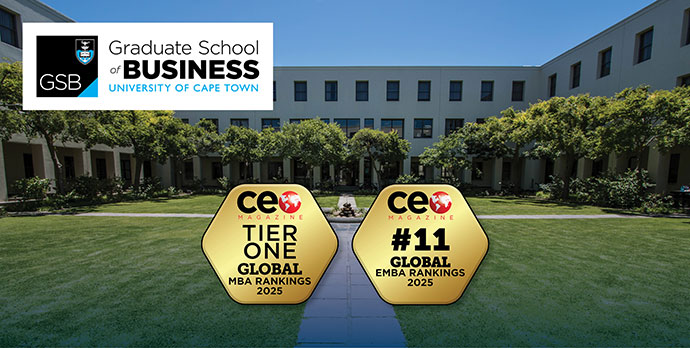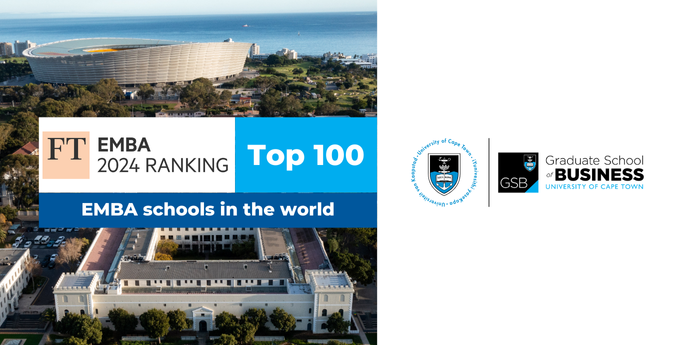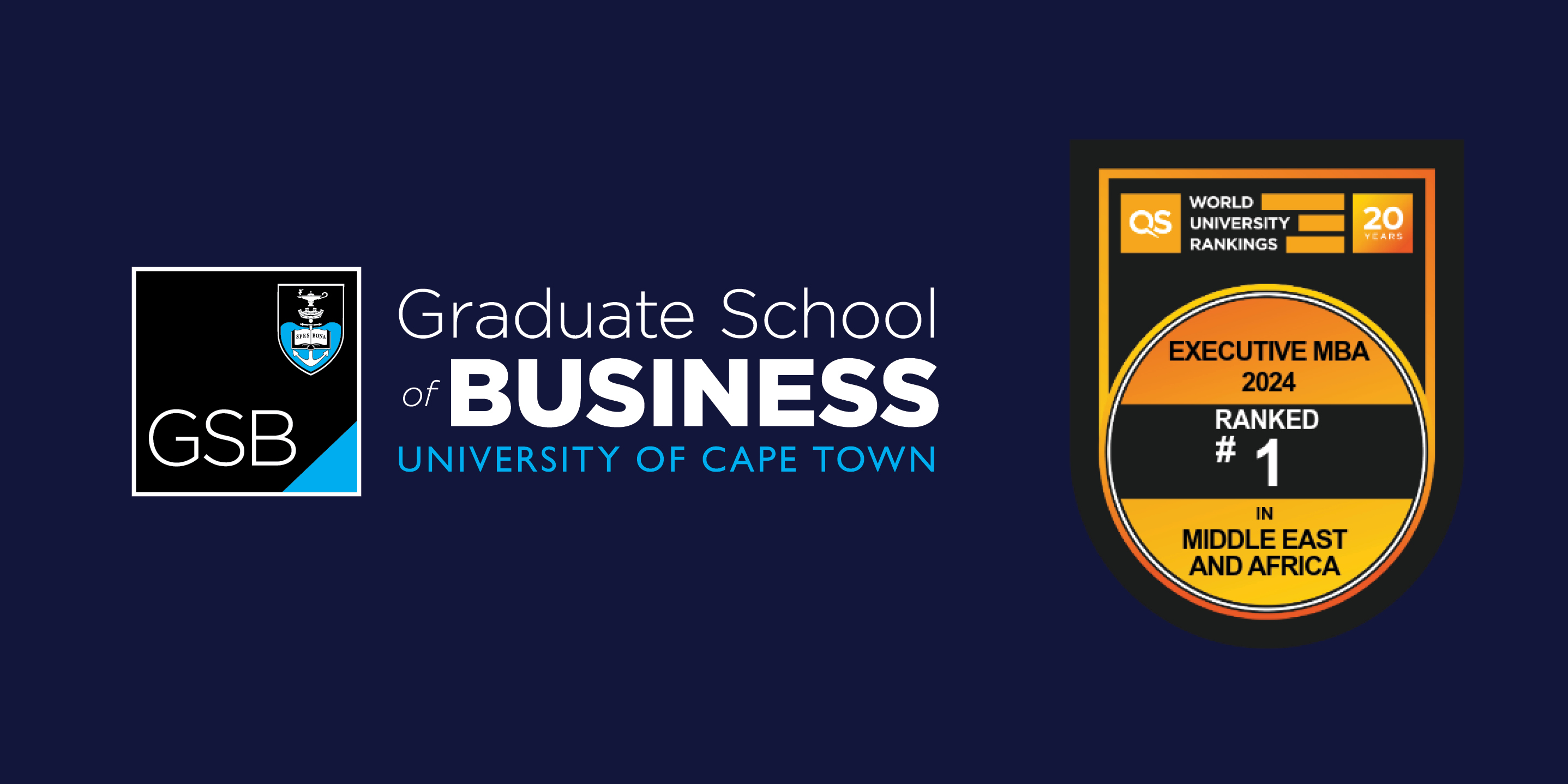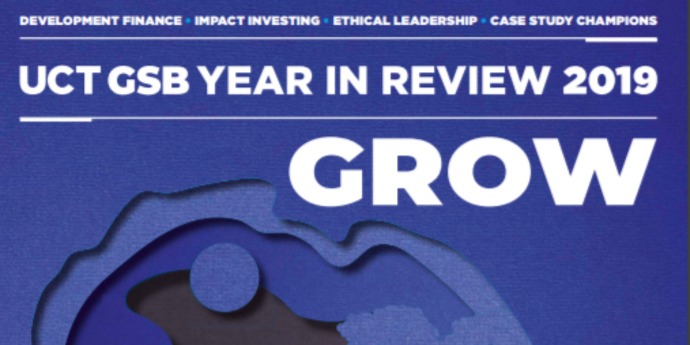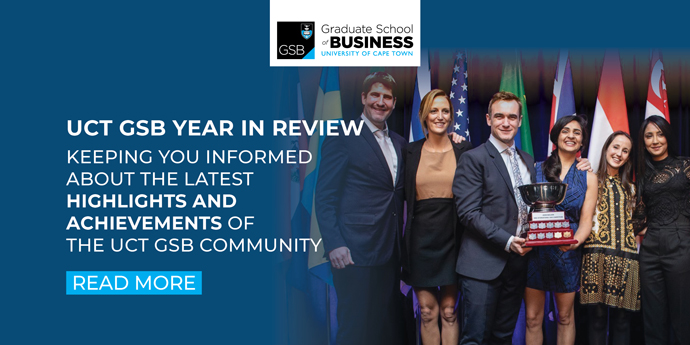Not many know that South Afica was one of the first two countries outside the USA to establish an MBA programme, all the way back in 1951. The other was Canada - so it’s apt that a South African business school should receive a prestigious accolade from a Canadian organisation in 2023. This week, UCT’s Graduate School of Business was honoured as the top-ranked business school in Africa in the annual Better World ranking. The Better World rankings, produced by Toronto-based Corporate Knights, rates the world’s most sustainable MBAs based on their commitment to ESG, or Environmental Social Governance.
“We are particularly proud of the fact that the Corporate Knights ranked the UCT GSB’s MBA 27th on its Better World ranking of global business schools,” says Dr Caitlin Ferreira, MBA Programme Director. In the words of Corporate Knights, this is a ranking that suggests that the GSB’s MBA is one of the best in the world at instilling holistic purpose in tomorrow’s leaders and ensuring they have the skills and values to build a more inclusive economy that benefits society and the natural world.
Corporate Knights is an award-winning magazine that produces research, rankings and reports on the world’s most sustainable companies. The Better World MBA ranking is based on seven metrics, all of which are based on publicly available information. These include the core course integration of sustainability, number of sustainability-related research publications per faculty member, sustainability-focused research institutes and centres as well as faculty gender- and racial diversity.
The Better World MBA ranking is yet another global accolade for a university consistently ranked as the best in Africa. The GSB’s MBA remains the only African MBA to have appeared on the Financial Times’ Global MBA ranking. In 2021 it was ranked 12th for Corporate Social Responsibility, 14th for International Course Experience and 5th in Value for Money.
A skill set honed for the future
“Educational programmes need to stay abreast of industry trends to ensure that students are equipped with relevant knowledge to navigate the working world - for this reason, we are likely to see a renewed interest in ESG in business education,” says Ferreira. “At the GSB, sustainability is a core pillar on which our MBA programme has been developed and we ensure that we use this as a guiding principle throughout our courses.”
All of the GSB’s MBA programmes are interwoven with strong ESG principles. ESG, which stands for Environmental Social Governance, is prominent in the core module focusing on strategic decision-making in a complex and dynamic context, while electives include Social Finance and the Social Innovation Lab. Students with a particular interest can hone their qualifications based on more specific skill sets for which there is a growing demand, through programmes including:
- A Master of Philosophy focusing on inclusive innovation
- Social impact, through the Bertha Centre
- Values-Based Leadership, through the Allan Gray Centre
- Specialised training for Development Finance professionals
Ferreira adds that it is likely that ESG will continue to grow both the business world and in education. “Empowered consumers whose expectations of companies have grown immensely in recent years will continue to place pressure on companies to be ethical corporate citizens,” she points out. “As such, we are likely to see a closer alignment and integration of ESG principles into business strategies.”
The evolving MBA
The fact that the Better World MBA ranking exists is a reminder of how much the thinking around the MBA has evolved. Curricula that emphasized profits and efficiency above all else may once have predominated, but the idea of business schools mass-producing executives interested only in the size of their bonuses now seems as out of date as shoulder pads and car phones.
Professor Ralph Hamann of the GSB has noticed a significant change in attitude over the years. When he started teaching MBA students about 15 years ago, a significant proportion of students considered sustainability irrelevant to business, and some were strongly sceptical about climate change. “That has radically changed, at least in our classes. Many of our students are now seeing sustainability as a core aspect of their personal career ambitions and indeed a strong reason for studying further at the GSB.”
The GSB’s formal history with ESG dates back to 2010, when management made a strategic decision to focus on sustainability. This led to the establishment of the Bertha Centre for Social Innovation and Entrepreneurship, as well as a course on social innovation and entrepreneurship in the MBA programme. In 2011-2013, the GSB also hosted an annual international conference, “The Business of Social and Environmental Innovation”.
In 2014, the GSB established a satellite hub in Philippi township, an informal settlement in one of the poorest areas of the city, in order to establish stronger connections between the academic work of the business school and the reality of severely resource-constrained environments.
“More recently, our faculty recruitment has had a strong sustainability orientation,” Hamann adds. “Of the seven new faculty recruited in 2022, many have a strong sustainability focus and all of them have some research and teaching interests on related themes.”
Stand out in the talent pool
Ultimately, the most compelling reason for students to take on the challenge of an MBA has been to improve their career growth prospects. There are many MBA programmes to choose from, and the Better World MBA ranking is yet another reason to consider studying at the Graduate School of Business.
Ferreira points out that the ability to stand out in an applicant pool is one of the reasons to look at ESG in the curriculum when it comes to choosing where to study. “ESG knowledge and expertise are in high demand across industries, and students should consider long-term career opportunities and growth.”
In addition, ESG principles have become fundamental components in ensuring a company’s long-term sustainability. “Those that have a foundational understanding of ESG principles and how they impact business and strategy are best suited to drive positive societal impact while ensuring long-term business success.”
In the words of Corporate Knights themselves, “We believe that companies meet their highest purpose when they serve the interests of people and the planet.” There’s no doubt that MBA graduates of the UCT GSB will be among the visionaries helping to drive the change needed to create a better world.



